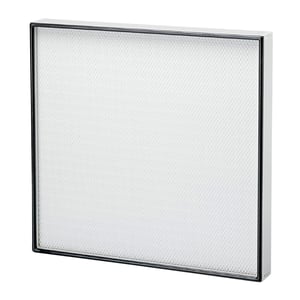5 critical facilities,
1 defence: HEPA filtration
In the realm of controlled environments, where precision,
purity, and protection are paramount, High-Efficiency Particulate Air (HEPA) filters emerge as unsung heroes. These specialized filters are designed to trap and eliminate microscopic particles, making them indispensable in various settings where maintaining air quality is non-negotiable. In this blog piece, Benjamin Ruehl our Senior Clean Process Product Manager will delve into the 5 critical facilities where HEPA filters are needed to protect people, products and processes.

In the healthcare sector, the protection of people is a non-negotiable. HEPA filters are extensively employed in hospitals, clinics, and laboratories to control airborne contaminants and safeguard patients, medical professionals, and sensitive equipment. These filters effectively capture bacteria, viruses, and other microorganisms, ensuring that the air we breathe is optimal to safeguard patients from the spread of airborne viruses.
In surgical theatres and critical care units, HEPA filters are integrated into ventilation systems to provide an additional layer of protection. By preventing the circulation of airborne pathogens, these filters contribute significantly to reducing the risk of hospital-acquired infections, underscoring their crucial role in healthcare settings. Applications are not only focussed on the supply air systems but also in negative pressure environments (such as isolation wards) HEPA filters are used with containment systems to ensure that highly contagious infections can not be spread.In Hospital Pharmacies the formulation of bespoke oncology medicines are carried out inside laminar flow booths and isolators to ensure pharmacist and drug protection .
In radioactive medicine one example is radioactive iodine (I-131). It has been used for over 50 years to treat thyroid cancer and hyperthyroidism, or an overactive thyroid. Now, it is also used to treat non-Hodgkin lymphoma and bone pain from some kinds of cancer and there are many other examples. Here HEPA filters are used in conjunction with Molecular solutions in highly contained equipment to protect patients and healthcare professionals.
Precision is paramount in laboratories and research facilities, where even the slightest contamination can compromise experiments and research outcomes. HEPA filters find extensive use in these environments to create ultra-clean spaces. These filters ensure that airborne particles, including dust, spores, and pollutants, are effectively removed, maintaining the integrity of experiments and the accuracy of results.
From genetic research to pharmaceutical development, HEPA filters contribute to creating controlled environments where researchers can work with confidence, knowing that the air quality meets the stringent requirements of their experiments. In cleanrooms and biocontainment areas, HEPA filters are a cornerstone, offering an additional layer of protection against potential cross-contamination. In Biosafety laboratories and research facilities worldwide HEPA filters are an integral part of protection of people and the environment. They are deployed on the inlet and outlet airstreams of the facilities to ensure that the sometimes dangerous micro-organisms being worked with in their important research cannot escape to the external atmosphere causing any harm.
The pharmaceutical and biotechnology industries demand unparalleled levels of cleanliness to ensure the safety and efficacy of medications and biopharmaceuticals. HEPA filters are integral to the design of cleanrooms and controlled environments in these sectors, that not only prevent the ingress of contaminants that could compromise the quality of pharmaceutical products but also support the protection of people from exposure to, sometimes harmful, particulates.
In pharmaceutical manufacturing, where sterile conditions are imperative, HEPA filters contribute to the creation of cleanrooms with controlled particle levels. These filters aid in meeting regulatory requirements and industry standards, ensuring that pharmaceutical products are produced in environments that adhere to the highest quality and safety standards.In pharmaceutical manufacturing ,were active pharmaceutical ingredients are potentially hazardous or toxic to human or animal health HEPA filters are deployed in safe-change technologies to protect personnel and the environment from these compounds.
Semiconductor & now Gigafactory manufacturing processes are incredibly sensitive to even the smallest particles. HEPA filters find extensive use in cleanrooms within semiconductor fabrication facilities. The semiconductor and high end power storage industry demands environments with controlled air quality to prevent defects and possible dangers in microelectronics manufacturing.
HEPA filters contribute to maintaining the necessary cleanliness levels by trapping particles that could otherwise settle on silicon wafers ,battery packs or other components during the manufacturing process. This meticulous control over air quality is instrumental in ensuring the production of high-quality and reliable semiconductor devices, from microprocessors to memory chips & safe energy storage devices (batteries).
HEPA filters are crucial in food and beverage production for maintaining cleanliness, ensuring product safety, and complying with stringent regulations. By effectively trapping airborne contaminants like bacteria and mould, HEPA filters prevent contamination, preserve product quality, and extend shelf life.
They play a vital role in preventing cross-contamination between different production zones and protecting worker health by reducing exposure to allergens and pathogens. HEPA filters are integral to upholding hygiene standards, meeting regulatory requirements, and safeguarding consumer safety throughout the production process, making them indispensable in the food and beverage industry.


